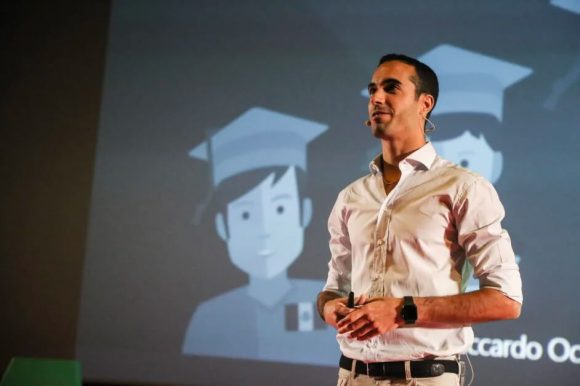Read the full article below (in Italian):


Written on April 11th 2024
Source here: B&FT Online
Open Institute of Technology (OPIT), an EU-accredited online institution renowned for its expertise in Information Technology (IT) education, has unveiled plans to increase enrollment from African countries, including Nigeria, Kenya, and Ghana, for the academic year 2024.
Since its inception in 2023, OPIT has been dedicated to providing world-class education in information technology, and now, it is expanding its global reach to welcome students from diverse backgrounds across Africa.

In its inaugural year, OPIT attracted a diverse cohort of 100 students from 38 different nations, with a notable representation from Africa. A proportion of both Bachelor’s (9percent) and Master’s (7percent) students originated from African countries, demonstrating OPIT’s commitment to fostering diversity and inclusivity within its student body.
Also, a substantial percentage (40percent) of Master’s students hailed from non-STEM backgrounds, underscoring OPIT’s dedication to providing educational opportunities to individuals from diverse professional domains. OPIT’s first cohort boasted students from a wide array of industries, including consulting, tech, gaming, energy, government, financial services, agriculture, oil and gas, and education, among others. This diverse mix of backgrounds contributes to a rich and vibrant learning environment at OPIT.
In anticipation of its upcoming student intake, OPIT has implemented several enhancements to its programmes, faculty, and support services:
New and enhanced programmes
OPIT has introduced four specialized tracks for its BSc in Computer Science programme for 2024, including Cybersecurity, Data Science & AI, Software Development & Cloud Computing, and Metaverse & Gaming. Additionally, a new BSc in Digital Business has been launched, catering to students interested in blending digital business with core computer science principles.
In addition to the existing MSc Applied Data Science and Artificial Intelligence (AI) programme, OPIT now offers other Masters Degree options:
 MSc Enterprise Cybersecurity
MSc Enterprise Cybersecurity MSc Applied Digital Business
MSc Applied Digital Business MSc Responsible Artificial Intelligence (AI)
MSc Responsible Artificial Intelligence (AI)Concerning its revamped Bachelors and Masters programmes, Professor Francesco Profumo, Rector of OPIT (and former Minister of Education, University and Research of Italy) said:“In an era marked by an inevitable acceleration towards the most urgent transitions impacting society in the digital age, OPIT’s mission is to focus on quality online education in Technology.
The starting point is the awareness of the misalignment in the labor market, between what is taught in most universities and what companies are looking for today. That so-called mismatch, accelerated by the advent of AI, is generated by too much theory and too little practical approach. We have identified the skills that will guide this change and translated them into our innovative Degrees.”

Faculty expansion
The faculty at OPIT stands out as one of its greatest assets. In 2024, OPIT’s faculty members boast a diverse blend of academic and professional experiences, with stints at renowned institutions and organizations including Symantec, Microsoft, PayPal, McKinsey, MIT, Morgan Stanley, University of Edinburgh, Amazon, US Naval Research, and more. This deliberate mix ensures a well-rounded approach to training at OPIT, incorporating both scholarly expertise and real-world insights.
Speaking concerning OPIT’s faculty and teaching, Riccardo Ocleppo, Founder and Director of OPIT stated: “Our teaching model combines quality, flexibility, and cost-effectiveness. We believe that education, even if it takes place remotely, must guarantee closeness on all other aspects, starting from the support for the student throughout the period of study. We have translated into practice a new idea of higher education, radically different from the offering from traditional universities.”
“To support our approach, we have selected some of the most experienced academics and professionals in the Technology sphere. The quality of the Professors and the innovative format guarantees a tier-1 learning experience within a community of people linked by the common goal of entering the job market with up-to-date, relevant skills.”
Experiences & opportunities
OPIT offers a diverse array of global perspectives, as students and faculty come from various corners of the world. A freshly established Career Services Department aims to forge stronger connections between students and their desired industries and career paths.
Moreover, students from Africa enrolling in 2024 will enjoy the advantage of having their degrees recognized by the World Education Services (WES). This recognition translates to the potential conversion of OPIT degrees into points for immigration assessment processes in the United States and Canada in the foreseeable future.
Related posts

Source:
- Agenda Digitale, published on June 16th, 2025
By Lokesh Vij, Professor of Cloud Computing Infrastructure, Cloud Development, Cloud Computing Automation and Ops and Cloud Data Stacks at OPIT – Open Institute of Technology
NIST identifies five key characteristics of cloud computing: on-demand self-service, network access, resource pooling, elasticity, and metered service. These pillars explain the success of the global cloud market of 912 billion in 2025
Read the full article below (in Italian):

You’ve probably seen two of the most recent popular social media trends. The first is creating and posting your personalized action figure version of yourself, complete with personalized accessories, from a yoga mat to your favorite musical instrument. There is also the Studio Ghibli trend, which creates an image of you in the style of a character from one of the animation studio’s popular films.
Both of these are possible thanks to OpenAI’s GPT-4o-powered image generator. But what are you risking when you upload a picture to generate this kind of content? More than you might imagine, according to Tom Vazdar, chair of cybersecurity at the Open Institute of Technology (OPIT), in a recent interview with Wired. Let’s take a closer look at the risks and how this issue ties into the issue of responsible artificial intelligence.
Uploading Your Image
To get a personalized image of yourself back from ChatGPT, you need to upload an actual photo, or potentially multiple images, and tell ChatGPT what you want. But in addition to using your image to generate content for you, OpenAI could also be using your willingly submitted image to help train its AI model. Vazdar, who is also CEO and AI & Cybersecurity Strategist at Riskoria and a board member for the Croatian AI Association, says that this kind of content is “a gold mine for training generative models,” but you have limited power over how that image is integrated into their training strategy.
Plus, you are uploading much more than just an image of yourself. Vazdar reminds us that we are handing over “an entire bundle of metadata.” This includes the EXIF data attached to the image, such as exactly when and where the photo was taken. And your photo may have more content in it than you imagine, with the background – including people, landmarks, and objects – also able to be tied to that time and place.
In addition to this, OpenAI also collects data about the device that you are using to engage with the platform, and, according to Vazdar, “There’s also behavioral data, such as what you typed, what kind of image you asked for, how you interacted with the interface and the frequency of those actions.”
After all that, OpenAI knows a lot about you, and soon, so could their AI model, because it is studying you.
How OpenAI Uses Your Data
OpenAI claims that they did not orchestrate these social media trends simply to get training data for their AI, and that’s almost certainly true. But they also aren’t denying that access to that freely uploaded data is a bonus. As Vazdar points out, “This trend, whether by design or a convenient opportunity, is providing the company with massive volumes of fresh, high-quality facial data from diverse age groups, ethnicities, and geographies.”
OpenAI isn’t the only company using your data to train its AI. Meta recently updated its privacy policy to allow the company to use your personal information on Meta-related services, such as Facebook, Instagram, and WhatsApp, to train its AI. While it is possible to opt-out, Meta isn’t advertising that fact or making it easy, which means that most users are sharing their data by default.
You can also control what happens with your data when using ChatGPT. Again, while not well publicized, you can use ChatGPT’s self-service tools to access, export, and delete your personal information, and opt out of having your content used to improve OpenAI’s model. Nevertheless, even if you choose these options, it is still worth it to strip data like location and time from images before uploading them and to consider the privacy of any images, including people and objects in the background, before sharing.
Are Data Protection Laws Keeping Up?
OpenAI and Meta need to provide these kinds of opt-outs due to data protection laws, such as GDPR in the EU and the UK. GDPR gives you the right to access or delete your data, and the use of biometric data requires your explicit consent. However, your photo only becomes biometric data when it is processed using a specific technical measure that allows for the unique identification of an individual.
But just because ChatGPT is not using this technology, doesn’t mean that ChatGPT can’t learn a lot about you from your images.
AI and Ethics Concerns
But you might wonder, “Isn’t it a good thing that AI is being trained using a diverse range of photos?” After all, there have been widespread reports in the past of AI struggling to recognize black faces because they have been trained mostly on white faces. Similarly, there have been reports of bias within AI due to the information it receives. Doesn’t sharing from a wide range of users help combat that? Yes, but there is so much more that could be done with that data without your knowledge or consent.
One of the biggest risks is that the data can be manipulated for marketing purposes, not just to get you to buy products, but also potentially to manipulate behavior. Take, for instance, the Cambridge Analytica scandal, which saw AI used to manipulate voters and the proliferation of deepfakes sharing false news.
Vazdar believes that AI should be used to promote human freedom and autonomy, not threaten it. It should be something that benefits humanity in the broadest possible sense, and not just those with the power to develop and profit from AI.
Responsible Artificial Intelligence
OPIT’s Master’s in Responsible AI combines technical expertise with a focus on the ethical implications of AI, diving into questions such as this one. Focusing on real-world applications, the course considers sustainable AI, environmental impact, ethical considerations, and social responsibility.
Completed over three or four 13-week terms, it starts with a foundation in technical artificial intelligence and then moves on to advanced AI applications. Students finish with a Capstone project, which sees them apply what they have learned to real-world problems.
Have questions?
Visit our FAQ page or get in touch with us!
Write us at +39 335 576 0263
Get in touch at hello@opit.com
Talk to one of our Study Advisors
We are international
We can speak in:


